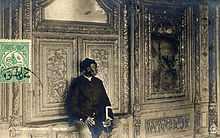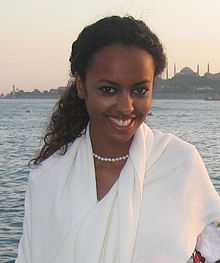Afro Turks
|
| |
| Regions with significant populations | |
|---|---|
| Muğla, Izmir, Antalya | |
| Languages | |
| Turkish, Cretan Greek |
Afro Turks are people of African origin in Turkey. Like the Afro-Abkhazians, they trace their origin back to the African branch of the Ottoman slave trade.
History
Beginning several centuries ago, a number of Africans, usually via Zanzibar (as Zanj) and from places such as Niger, Saudi Arabia, Libya, Kenya and Sudan,[1] came to the Ottoman Empire settled by the Dalaman, Menderes and Gediz valleys, Manavgat, and Çukurova. African quarters of 19th-century İzmir, including Sabırtaşı, Dolapkuyu, Tamaşalık, İkiçeşmelik, and Ballıkuyu, are mentioned in contemporary records.[2]

Some came from Crete following the population exchange between Greece and Turkey in 1923. They settled on the Aegean coast, mainly around İzmir.[3] Africans in Ayvalık declare that their ancestors from Crete spoke Greek when they came to Turkey and learned Turkish later.[4] Afro-Turks living in İzmir celebrated the traditional spring festival Dana Bayramı ("Calf Festival") until the 1960s. Dana Bayramı has currently been revived among the younger generation of Afro-Turks.[2]
Ulcinj in Montenegro had its own black community – descendants of the Ottoman slave trade that had flourished there.[5] As a consequence of the slave trade and privateer activity, it is told how until 1878 in Ulcinj 100 black people lived.[6] The Ottoman Army counted thousands of Black African soldiers in its ranks. The army sent to Balkans during the Austro-Turkish War of 1716–18 included 24,000 men from Africa.[7]
Today
Areas with significant populations are in the Aegean Region, especially İzmir, Aydın, and Muğla. At the time of Barack Obama's inauguration, a group of Afro-Turks from the districts Ortaca, Dalaman, and Köyceğiz gathered in Ortaca for celebration.[8] There are also people of African ancestry living in some villages and municipalities of Antalya and Adana provinces.[9] Some of the descendants of the African settlers remain, mixed with the rest of the population in these areas, and many migrated to larger cities.[3] These factors make it difficult to guess the number of Afro-Turks.[10]
Notable Afro-Turks
Arts
- Esmeray, singer
- Tuğçe Güder, adopted by Turkish parents, model and actress
- Kuzgun Acar, sculptor
- Mansur Ark, musician
- Safiye Ayla, musician
- Yasemin Esmergül, actress
- Ahmet Kostarika, actor
- Dursune Şirin, actress
- İbrahim Şirin, classical Ottoman musician
- Cenk Sökmen, musician
- Melis Sökmen, actress, musician (Guinean grandmother)
- Sait Sökmen, ballet dancer, choreographer (Guinean mother)
- Sibel Sürel, ballerina
- Ali Tınaz, actor, television presenter
- Tuncay Vural, choreographer
- Tracey Emin, English artist (Turkish Cypriot father, whose grandfather was Sudanese)
- Defne Joy Foster, actress, presenter (African-American father)
Sports
- Fercani Bey, footballer
- Ömer Besim Koşalay, athlete, journalist
- Vahap Özaltay, footballer
- Hadi Türkmen, former vice-president of the Turkish Football Federation
- Sadri Usuoğlu, football manager
- Mustafa Yıldız known as "Arap Mustafa", 1972 and 1981 Kırkpınar champion
Literature
- Mustafa Olpak, writer and activist
Politics
- Zenci Musa, Teşkilât-ı Mahsûsa member
- Baroness Meral Hussein-Ece, whose great grandfather was a Sudanese slave, taken to Cyprus.[11]
Military
- Ahmet Ali (Arap Ahmet), Ottoman military pilot
See also
- Afro-Arab
- Afro Iranian
- Afro Iraqis
- Black people in the Ottoman Empire
- Black people in Turkey
- Slavery in the Ottoman Empire
- Zanj
Notes
- ↑ "Turks with African ancestors want their existence to be felt". Todayszaman.com. 2008-05-11. Retrieved 2012-05-03.
- ↑ 2.0 2.1 "Afro-Türklerin tarihi, ''Radikal'', 30 August 2008, retrieved 22 January 2009". Radikal.com.tr. 2008-08-30. Retrieved 2012-05-03.
- ↑ 3.0 3.1 "Turks with African ancestors want their existence to be felt". Today's Zaman. Todayszaman.com. 11 May 2008. Retrieved 28 August 2008.
- ↑ Yerleşim Yerleri ve Göç: Balıkesir/Ayvalık, afroturk.org, retrieved 25 January 2009
- ↑ "Yugoslavia – Montenegro and Kosovo – The Next Conflict?". Cyber-adventures.com. 1997-01-16. Retrieved 2012-05-03.
- ↑ "Ulcinj – History". Visit-montenegro.com. Retrieved 2012-05-03.
- ↑ Dieudonne Gnammankou, "African Slave Trade in Russia", in Doudou Diene, La Chaine et le lien, Paris: Editions UNESCO, 1998.
- ↑ "Afro-Turks meet to celebrate Obama inauguration". Today's Zaman. Todayszaman.com. 20 January 2009. Retrieved 22 January 2009.
- ↑ "Yerleşim Yerleri ve Göç". Afroturk.org. Retrieved 25 January 2009.
- ↑ Afrika'nın kapıları İzmir'e açılıyor, Yeni Asır, 21 November 2008, retrieved 25 January 2009.
- ↑ Marie Woolf: "UK peer Meral Hussein-Ece and artist cousin Tracey Emin trace roots to slavery", The Australian, 19 July, 2010
External links
- (Turkish) Afro-Turk Website of the Afro-Turks' association in Ayvalık
- (Turkish) Sessiz Bir Geçmişten Sesler Website of a research project on Afro-Turks
- (English) Turks with African ancestors want their existence to be felt, Today's Zaman, 25 June 2008
- (English) , article published on 27 August 2012 about the Calf Fest, the Afro-Der Association and recent developments.
| ||||||||||||||||||||||||||||||||||||||||||||||||||||||
| ||||||||||||||||||
| ||||||||||||


